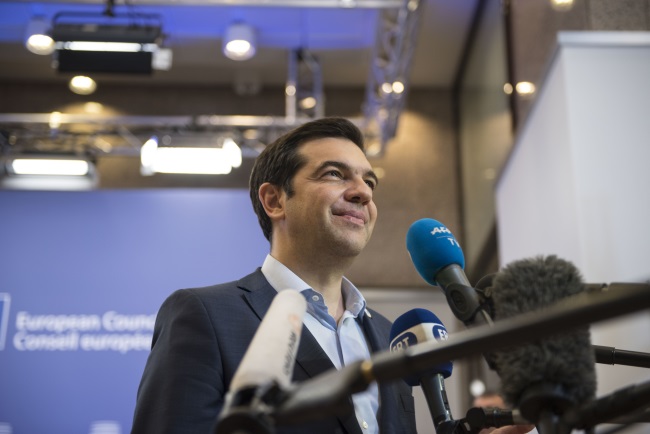by Nikos Chrysoloras,Matthew Campbell & Eleni Chrepa, Bloomberg
Prime Minister Alexis Tsipras, who came to office six months ago pledging to end austerity and restore “dignity” to the Greek people, now plans to sell an onerous bailout deal at home by arguing it could have been much worse.
That was the message Tsipras delivered Monday morning in Brussels after all-night talks with European leaders. They resulted in plans for large-scale asset sales, tax hikes and spending cuts, many of which must be approved by parliament right away. The agreement, he said, would avert “a collapse of the financial system” and, most importantly, keep Greece in the euro, which the premier calls his No. 1 goal.
Tsipras is seeking to implement measures even harsher than those rejected by Greek voters in the July 5 referendum on austerity — which he himself called after the previous round of discussions. To succeed, he may need to begin by shoring up his own party ranks.
“A government reshuffle is in the cards, probably with Tsipras as prime minister and support from opposition parties,” said George Pagoulatos, a professor of European politics and economy at the Athens University of Economics and Business. More than 30 members of parliament from the left wing of Syriza could abandon him, Pagoulatos said.
The plan, agreed to by Greece and the leaders of the 18 other euro countries, requires a level of austerity that Tsipras’s Coalition of the Radical Left, or Syriza, will find difficult to swallow.
Political Earthquake
Syriza’s landslide electoral victory represented a political earthquake in Greece, sending relations with European partners into disarray and serving as an inspiration to otherleft-wing parties across Europe.
On election night in late January, Tsipras told cheering crowds in central Athens that “continued kowtowing” to creditors would end. The landslide victory swept aside New Democracy, Greece’s traditional center-right party, which had urged voters to stay the course with existing bailout arrangements.
In exchange for aid, Syriza’s leader is now endorsing pension reductions, sales tax increases and “quasi-automatic spending cuts” in the event that Greece’s government budget fails to hit surplus targets.
“We took the responsibility of the decision to avert the most extreme plans of the most extreme conservative forces in the European Union,” Tsipras said after 17 hours of meetings. “We averted the plan to cause a credit crunch and the collapse of the financial system, a plan which had been prepared in great detail.”
Asset Sales
Monday’s deal also envisions as much as 50 billion euros in sales or other monetization of state assets, to be used partly to pay off debt and partly to pay back funds for the recapitalization of banks. Greek lenders have been shut for more than two weeks to stem withdrawals.
Syriza currently has 149 seats in the 300-seat legislature and governs with the support of the Independent Greeks party, with 13 seats. Its leader on Sunday tweeted that “enough was enough” in bailout talks, raising the prospect of a departure from the ruling coalition.
The expected Greek parliament vote Wednesday sets up a major political test for Tsipras. Seventeen Syriza lawmakers declined to support him in a vote endorsing lighter austerity measures last week, including the parliament speaker and the energy minister.
The package passed easily with the help of opposition parties, who also are expected to ensure approval of the new deal. A deterioration of support for Tsipras within Syriza, though, could set the stage for early elections.
Party Divisions
An sign of internal opposition emerged quickly Monday morning, with the Left Platform, a Syriza faction headed by energy minister Panagiotis Lafazanis, saying the deal would mean “social enslavement” for Greeks. In a statement on its Web site, the grouping called for rejection of the accord.
“Things are pretty clear. There’s a situation of division within the party,” Syriza parliament member Yannis Balafas said. “What I can also say is that within a few months, in 2015, we will have to go to elections.”
Tsipras did win a concession on asset sales. An initial text called for the disposals to be administered by a fund based in Luxembourg, implying a loss of Greek control; the final agreement said the fund will be “established in Greece and managed by the Greek authorities,” with EU supervision.
In Brussels, Tsipras was at pains to argue his half-year in power hasn’t been for naught, even as he agreed to measures that he’s spent most of his short premiership arguing against.
“We put up a hard fight for the past six months,” he said. “We fought to the end in order to get the best out of it, to get a deal which will allow the country to stand on its feet and the Greek people to keep fighting.”



















